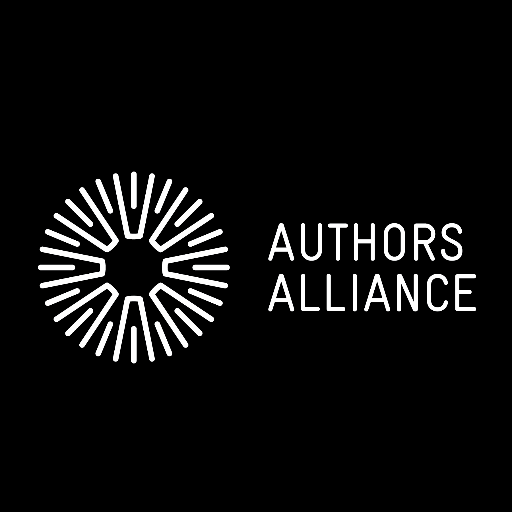Authors Alliance
 A new organization called the Authors Alliance launched last May that seeks to represent authors that fall outside of the type of popular author represented by the Authors Guild. According to their website:
A new organization called the Authors Alliance launched last May that seeks to represent authors that fall outside of the type of popular author represented by the Authors Guild. According to their website:
The mission of Authors Alliance is to further the public interest in facilitating widespread access to works of authorship by assisting and representing authors who want to disseminate knowledge and products of the imagination broadly. We provide information and tools designed to help authors better understand and manage key legal, technological, and institutional aspects of authorship in the digital age. We are also a voice for authors in discussions about public and institutional policies that might promote or inhibit the broad dissemination they seek.
The Author’s Alliance was created by Pam Samuelson and others in response to their concern that the Authors Guild does not adequately represent the views and needs of many authors. For example, speaking to Publishers Weekly, Samuelson notes lawsuits against Google and HathiTrust over the book digitization project undertaken by Google and a number of university libraries, and argues that many, if not most, of the authors represented in that corpus would support the project as a way to make their works more findable.
Author T.J. Stiles, board member of the Authors Guild, sent a strong statement to the San Francisco Writers’ Grotto about the Authors Alliance.
If any of you earn a living as a writer, or hope to, I strongly urge you not to join the Authors Alliance. If you think authors should be the ones to decide what is done with their books, then I strongly urge you not to join.
However, if you are an academic, or scorn the idea of making a living from writing as a quest for “fame and fortune,” the Authors Alliance may be the organization for you.
The concern behind this statement is that the Authors Alliance is interested in copyright reform. The group released a Principles and Proposals for Copyright Reform developed around four principles:
We propose four principles that should guide copyright law and appropriately align the interests of individual creators with the interests of the public for whom they create:
1. Further empower authors to disseminate their works.
2. Improve information flows about copyright ownership.
3. Affirm the vitality of limits on copyright that enable us to do our work and reach our audiences.
4. Ensure that copyright’s remedies and enforcement mechanisms protect our interests
Many academic authors are motivated to publish by a desire to share useful research and advance scholarship in their disciplines rather than a desire for “fame and fortune.” Copyright Transfer Agreements proffered by many traditional publishers hinder access to published research, restrict the author’s ability to share the work, and are confusing or misleading.
The Authors Alliance will focus on helping authors manage their rights, reach new audiences, authorship law and policy, and authorial reputation and integrity.
Interested in learning more?
http://www.authorsalliance.org
http://www.authorsalliance.org/our-issues/